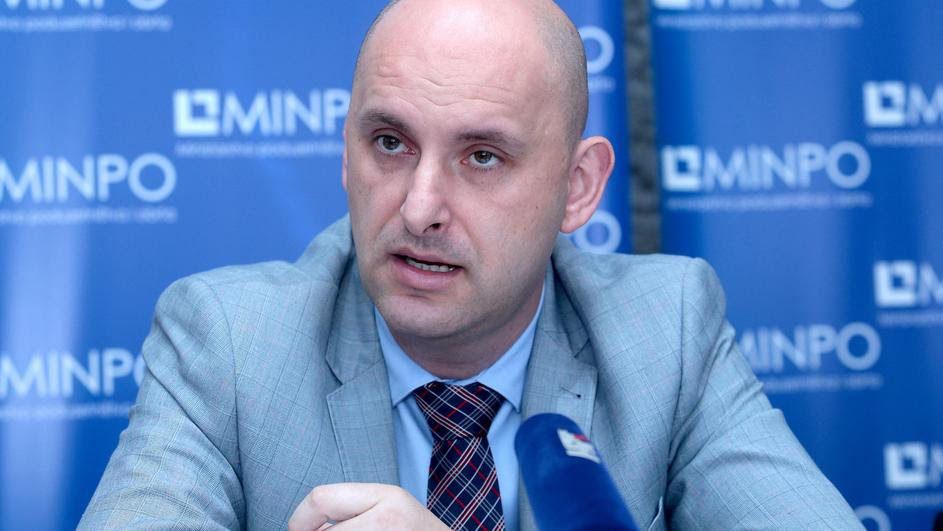
From left: Minister Darko Horvat
Minister Tomislav Tolusic and
Vjeran Vrbanec, president HAMAG-BICRO
A long awaited lift to the prospects of desperately needed boost to small to medium business enterprise in Croatia has finally surfaced, promising to prop-up the dying economy and revitalise job numbers, create new jobs there where it counts when it comes to preventing people leaving Croatia in search of jobs elsewhere. Small and medium business has always been the backbone and sustenance of a stable and solid economy – it’s taken Croatia many years to actually help the idea of this fact infiltrate what occurs on the ground and, so, this is great news. The official signing of an Agreement on financing between Croatia’s ministry of regional development and EU funds, Croatian agency for small business, innovations and investments (HAMAG-BICRO) and EU funds was held in Zagreb on Thursday 30th June 2016. This Agreement relates to the implementation of financial instruments within the framework of the operative program known as “Competitiveness and Cohesion” 2014 – 2020. The main aims of the Competitiveness and Cohesion program are to boost economic competitiveness, support alignment with the EU environmental acquis, invest in transport infrastructure (TEN-T) and network infrastructure. The EU allocation amounts to EUR 6.88 billion (4.3 billion from the European Regional and Development Fund (ERDF) and 2.56 billion from the Cohesion Fund). Almost 60% of the ERDF allocation is aimed at strengthening the economic competitiveness of Croatia. It’s said that it will support national efforts to develop an innovation-driven economy, primarily by building-up scientific excellence, encouraging Research/Development/Innovation investment and technology transfer in the business sector. Next generation network (NGN) broadband will be further extended and e-public services developed. Competitiveness and innovation in Small and Medium sized Enterprises will be supported through increased entrepreneurship, better access to finance and the development of high-quality business services. Drawing available EU funds for Croatian business development has been pitiful since Croatia became EU member three years ago – one would be justified in thinking that this was due to the formal Social Democrat government’s inability or sabotage – or even both. It’s almost unthinkable that a government of a country with serious economic problems would not even come up with processes for utilising the EU financial assistance, let alone draw on available funds to the full. Well, that is exactly what happened in Croatia during the past two years – creating the economic hopelessness that sent significant numbers of skilled and qualified Croats abroad and lowered living standards of those that remained. Based on 2014 the results of international research (Global Entrepreneurship Monitor, Doing Business, Global Competitiveness Report, Corruption Perceptions Index), in which Croatia has been involved for many years, the key development problems of the small and medium enterprise sector in Croatia have been identified: insufficient level of new business venture start-up activity, small share of growing enterprises, limiting administrative barriers to implementation of entrepreneurial activity, insufficient development of the financial market, and lack of education focused on the development of entrepreneurial knowledge and skills. Small and medium enterprises (SME) are the most important driver of the economy, and the important role of this sector is particularly evident through their share in employment, in total realised income and exports. Successful performance of the SME sector is more important than ever. Growing small and medium enterprises are an essential part of the solution to the problem of long-term high unemployment in Croatia and the shedding of essential talent through increased emigration as a result of a poor employment market. Survival and development of Croatian small and medium enterprises in the European Union’s single market depend on their ability to compete successfully and adaptation to the demanding market and fierce competition. The Agreement signed in Zagreb last Thursday has for the first time ever in Croatia enabled access for small and medium business entrepreneurs to the EU structural and investment funds via financial instruments. The Agreement represents the most significant reform in business entrepreneurship and trade – new finance instruments with maximum credit potential, which will secure favourable guarantees for business projects thatinclude most favourable conditions in the business market and exceptionally low interest rates – notes the website of Croatia’s Ministry of Regional Development and EU Funds. Micro and small business loans, individual and portfolio guarantees as well as the interest rates subsidy are said to significantly lighten the entrepreneurs’ access to financing in the coming period.

Minister Tomislav Tolusic
Photo:Patrik Macek/Pixsell
“Entrepreneurs will have at their disposal loans at lower interest rates than those offered by banks and they will be able to secure favourable guarantees. The financial instruments that entail significantly reduced or smaller administrative requirements also enable a much simpler access to EU funds for entrepreneurs in Croatia,” said minister Tomislav Tolusic. There are four new financial products that will be kicked-off as a result of this Agreement: “Micro Credits”, “Small Loans”, “Limited Portfolio Guarantee” and “Individual Guarantees”. These will be administered by the Croatian agency for small business, innovations and investments (HAMAG-BICRO). This sweep into significant business reform has already guaranteed the sum of almost 1.2 billion kuna (160 million euro) for small and medium business. HAMAG-BICRO Board president Vjeran Vrbanec said that the activation of these financial instruments through the four said financial products will realise small and medium business loans to the value of some 600 million euro – which is quite significant for the size of Croatian economy at this stage. HAMAG-BICRO will head the implementation of micro and small loans between 25,000 and 50,000 euro to business applicants; interest rate will reportedly be from 0.5 to 1.5% for investment projects and up to 3.5% for trade financial resources. On the other hand, said Vrbanec, assurances to commercial banks will include guarantees that the entrepreneurs who have borrowed funds from them will in fact repay their loans. The Agreement also enables interest rate co-financing.

“If the banks will be so flexible that they lower the interest rate for each individual entrepreneur, we are then prepared to a further reduction of the interest rate for those entrepreneurs. If, for instance, the interest rate on some loan is 4% it can be lowered to 1 or 0,5% and in some situation to even 0%,” claims Vrbanec. Minister Tolusic said that the loans will be available from August this year and involved guarantees by the end of this year. If negotiations succeed, large companies could also be able to access similar loans at favourable interest rates through the Croatian Reconstruction and Development bank, says Tolusic.

Minister Darko Horvat
Photo: HINA/ Daniel KASAP / dk
Minister for small and medium-sized business, Darko Horvat, has pointed out that the potential of some 13 billion kuna (165 million euro) has already been identified for project proposals of micro, small and medium trading companies/businesses. He said that 10 billion kuna investments raise the GDP by 1% and, hence, it’s expected that the GDP will increase this year by that percentage. “The new financial instruments are an another indication of this government’s persistent efforts to remove barriers in the business environment, its efforts in securing of strong business establishments within the Croatian economy and its efforts in creating a healthy investment environment. With this reform we have succeeded in relocating the intensive support for small business from the Croatian government budget to the EU budget,” stated minister Horvat. As this government is only in care-taker mode and with general elections due in September this year a keen eye needs to be kept on the actual implementation of the Agreement signed last Thursday that offers small and medium business a real chance of life and success. It doesn’t take much to stuff things up in Croatia when it comes to the implementation of major reforms – it’s still suffering within the former communist Yugoslavia non-entrepreneurial and a largely anti-private-business environment at the grassroots or at trade activity level. However, with the continuance and increase of targeted education and support that steer successful business development – a vibrant and well-endowed economy may indeed be possible in Croatia. Ina Vukic, Prof. (Zgb); B.A., M.A.Ps. (Syd)
|
|




Nema komentara:
Objavi komentar